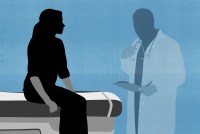Latest KFF Health News Stories
Doctors and Patients Try to Shame Insurers Online to Reverse Prior Authorization Denials
Prior authorization is a common tool used by health insurers for many tests, procedures, and prescriptions. Frustrated by the process, patients and doctors have turned to social media to publicly shame insurance companies and elevate their denials for further review.
Pioneering Study Links Testicular Cancer Among Military Personnel to ‘Forever Chemicals’
The military first documented health concerns surrounding chemicals known as PFAS decades ago yet has continued to use firefighting foam made with them. Despite scores of lawsuits by its personnel and high rates of testicular cancer among troops, it has been slow to investigate a connection.
As Nonprofit Hospitals Reap Big Tax Breaks, States Scrutinize Their Required Charity Spending
Nonprofit hospitals avoid paying taxes if they provide community benefits such as charity care. More states are examining that trade-off, scrutinizing the extent of hospitals’ spending on their communities.
As Low-Nicotine Cigarettes Hit the Market, Anti-Smoking Groups Press for Wider Standard
The first FDA-authorized cigarettes with 95% less nicotine than traditional smokes will go on sale in California, Florida, and Texas starting in early July. Anti-smoking groups oppose greenlighting just one plant biotech’s products and instead urge federal regulators to set a low-nicotine standard for the entire industry.
La atención primaria está cambiando: el acceso y la calidad están en juego
Una relación sólida y duradera con un médico de atención primaria —que conozca el historial del paciente y pueda vigilar nuevos problemas— se ha considerado durante mucho tiempo la base de un sistema sanitario de calidad.
Will the Doctor See You Now? The Health System’s Changing Landscape
The “front door” to the health system is changing, under pressure from increased demand, consolidation, and changing patient expectations.
Familias huyen de los estados que niegan atención de salud a las personas trans
Más de una cuarta parte de los adultos trans encuestados por KFF y The Washington Post a fines del año pasado dijeron que se mudaron a otro vecindario, ciudad o estado en busca de un ambiente más tolerante.
Medical Exiles: Families Flee States Amid Crackdown on Transgender Care
As more states restrict gender-affirming care for transgender people, some are relocating to more welcoming destinations, such as California, Illinois, Maryland, and Nevada, where they don’t have to worry about being locked out of medical care.
What One Hospital’s Slow Recovery From a Cyberattack Means for Patients
U.S. hospitals have seen a record number of cyberattacks over the past few years. Getting hacked can cost a hospital millions of dollars, expose patient data, and even jeopardize patient care.
Escasez crónica de salvavidas resalta desigualdades raciales
Cuando las autoridades locales toman decisiones sobre el cierre de piscinas o la reducción de horarios, lo hacen sabiendo que la natación tiene un tenso historial de desigualdades raciales.
Chronic Lifeguard Shortage Serves as Springboard to Address Racial Inequities
Cities and towns are again in deep waters this summer trying to hire enough lifeguards to open their public pools. Many are proceeding with sensitivity to issues of race and ethnicity.
How to Negotiate With Resistant Aging Parents? Borrow These Tips From the Business World
Negotiation techniques can help health care providers and family caregivers find common ground with older adults who resist advice or support.
How a Medical Recoding May Limit Cancer Patients’ Options for Breast Reconstruction
The federal government’s arcane process for medical coding is influencing which reconstructive surgery options are available, creating anxiety for breast cancer patients.
Small, Rural Communities Have Become Abortion Access Battlegrounds
After local leaders in rural Nevada reached an impasse over a proposed Planned Parenthood clinic, an anti-abortion activist pitching local abortion bans across the U.S. arrived at their remote City Hall.
Pequeñas comunidades rurales se han convertido en campos de batalla por el acceso al aborto
La búsqueda por promulgar prohibiciones locales se ha vuelto particularmente crítica en pueblos pequeños, situados en las fronteras entre estados que han restringido el aborto y estados donde las leyes preservan el acceso.
When Older Parents Resist Help or Advice, Use These Tips to Cope
Dealing with a stubborn or resistant older parent can be a difficult problem for adult children. Family caregivers and professionals have some hard-won lessons on how to manage these evolving relationships.
Tips para ayudar a los padres mayores que se resisten a recibir ayuda o consejos
Lidiar con un padre mayor que se resiste obstinadamente a aceptar ayuda no es fácil. Pero la solución no es que los padres sientan que se está pasando por encima de ellos, tomando el control de sus asuntos.
California Confronts Overdose Epidemic Among Former Prison Inmates
Individuals newly released from prison are 40 times as likely to die of opioid overdoses than members of the general population, researchers say. In response, California corrections officials aim to arm departing inmates with an antidote that can be used to reverse the effects of opioid poisoning.
El trabajo en Chicago, Philadelphia, Los Ángeles y Nueva York halló que los niños negros no hispanos tenían 100 veces más probabilidades que los blancos no hispanos de ser víctimas de tiroteos mortales y no mortales.
Gun Assault Rates Doubled for Children in 4 Major Cities During the Pandemic, New Data Shows
A study of roughly 2,700 shootings in Chicago, Los Angeles, New York, and Philadelphia found that racial disparities in gun injuries and deaths widened during the covid-19 pandemic. Researchers looked only at assaults, excluding accidents or incidents of self-harm.




















